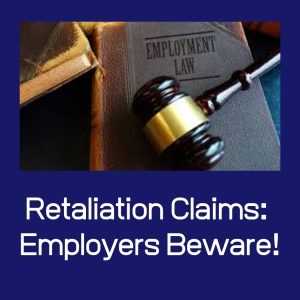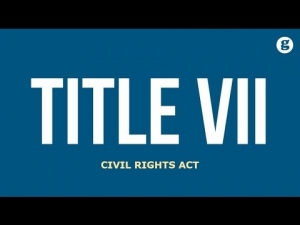Pandemic Challenges for Employers
Reprinted with permission from Lower Bucks Chamber of Commerce Outlook Magazine, July/August 2021 Edition
The pandemic changed the workplace dramatically, and perhaps permanently. COVID called upon employers to adapt to remote work with very little notice and preparation. Employers then adapted their offices and workspaces to allow employees to work safely in their facilities with masks and social distancing. And then, just as quickly, CDC modified its masking guidance. Employers are challenged to comply with changing guidelines and existing laws and a very competitive job market. Employers must consider new masking guidelines, vaccination mandates and remote work options, as well as the laws that apply to those considerations.
When the pandemic started, CDC guidelines presented a simple rule: In-person workplaces should require employees to wear masks, unless there was a health reason that prevented an employee from doing so. If an employee had a health reason not to mask, the employer could comply with the Americans with Disabilities Act, and the Pennsylvania Human Relations Act, by accommodating the employee who provided medical documentation of the health issue. The CDC recently changed its guidance to state that vaccinated people do not need to wear masks, and this is where it gets complicated.
RETALIATION CLAIMS: EMPLOYERS BEWARE!
Most employers these days are aware of the many workplace claims an employee might bring, including allegations of discrimination on account of race, color, religion, sex, national origin, sexual orientation, pay, age, or disability. Among other claims are those brought under the Fair Labor Standards Act (minimum wage, overtime) and the Family Medical Leave Act.
Employers paradoxically seem less aware of a retaliation claim an employee may bring. Paradoxically, because as reported by the Equal Employment Opportunity Commission (“EEOC”-the federal agency responsible for enforcing laws prohibiting employment discrimination), retaliation claims constituted the highest percentage of all charges filed in its fiscal year 2019.
Moreover, as discussed below, retaliation claims, by which an employee can obtain the same remedies as discrimination claims, are often easier for an employee to prove.
A recent opinion by the United States Court of Appeals for the Third Circuit (covering Pennsylvania) illustrates what an employee must do to state a case for retaliation and how an employer might defend the action.
Supreme Court Finds Title VII’S Requirement to File a Charge of Discrimination is not Jurisdictional
Reprinted with permission from the June 21st edition of The Legal Intelligencer. (c) 2019 ALM Media Properties. Further duplication without permission is prohibited.
In Fort Bend County v. Davis, 587 U.S. ___ (2019), the Court held that the requirement that a plaintiff in an employment discrimination case brought under Title VII, 42 U.S.C. § 2000e, et seq, file a charge of discrimination with the Equal Employment Opportunity Commission (“EEOC”) prior to filing a complaint in court is a procedural and not a jurisdiction requirement. Therefore, an employer’s failure to assert the absence of an appropriate charge of discrimination in a motion to dismiss results in a waiver of the defense. The Supreme Court’s decision resolves a split in the circuits regarding whether the requirement is jurisdictional, and highlighted the importance of the charge of discrimination and the motion to dismiss in employment discrimination cases.
No Request is Too Small for Your HR Department
I hear a lot of interesting stories in my line of work: there are as many interesting employment law problems as there are interesting people, which is to say, a lot. A recent opinion from the United States Court of Appeals for the Fourth Circuit encapsulates this variety nicely, and serves as a reminder not to disregard unorthodox employee requests.
In EEOC v. Consol Energy, the Equal Employment Opportunity Commission sued Consol Energy on behalf of one of Consol’s employees, Beverly K. Butcher. Mr. Butcher worked diligently for Consol Energy for 37 years when his employer decided to install a biometric hand scanner to track employee attendance. Consol required each employee to have his or her hand scanned, and then, upon entering or departing the workplace, required the employee to wave the hand over the scanner.
Mr. Butcher identifies as a devout evangelical Christian. While the hand scanner seems like a fairly innocent and efficient way to track employees, Mr. Butcher did not see it that way. Mr. Butcher’s faith informed his belief in an Antichrist, whose followers are condemned to everlasting punishment. The followers of the Antichrist are identified by the Mark of the Beast. Mr. Butcher feared that the use of the hand scanner would result in his receiving the Mark of the Beast. No one disputed that Mr. Butcher’s belief were sincerely held. Indeed, Mr. Butcher resigned rather than submit to the new hand scanning rules, after his employer failed to accommodate his request.
The EEOC sued on Mr. Butcher’s behalf, arguing that the failure to accommodate Mr. Butcher’s sincerely held religious belief violated Mr. Butcher’s civil rights. A federal jury in West Virginia returned a verdict in excess of $550,000 in Mr. Butcher’s favor, finding that Consol had constructively discharged Mr. Butcher in violation of his rights to accommodations for his religious beliefs. For want of a simple accommodation, Consol Energy risked a verdict in excess of a $550,000, not to mention the related legal fees and expenses. Interestingly, Consol does not appear to have offered any operational reason for its failure to accommodate: other employees were permitted to clock in by entering their personnel numbers into a keypad, without additional cost or burden to the company. Indeed, email produced in the case seems to indicate that the employer was scoffing at the religious objection.
It would have been cheap and easy for Consol to accommodate the request. The failure to do so appears to be based on a judgment about the validity of the request. This type of fact pattern presents itself often in many contexts: religious accommodations, disability accommodations, requests for medical leave. It is easy, as Consol Energy appears to have done, to disregard requests as “kooky” or “odd.” This is a mistake. If the accommodation is not needed, or is overburdensome, or is not based in fact, that will come out in the accommodation process. The danger lies in not following the process that such a request, however strange, requires. Certainly, it is well worth the effort in the beginning to avoid the stress and expense of litigation later.
























